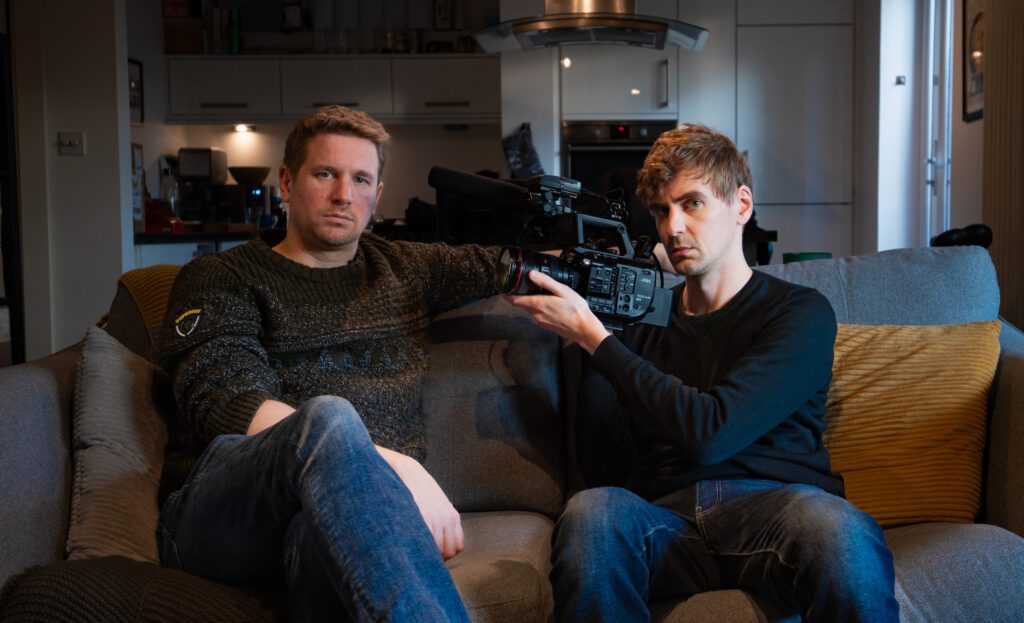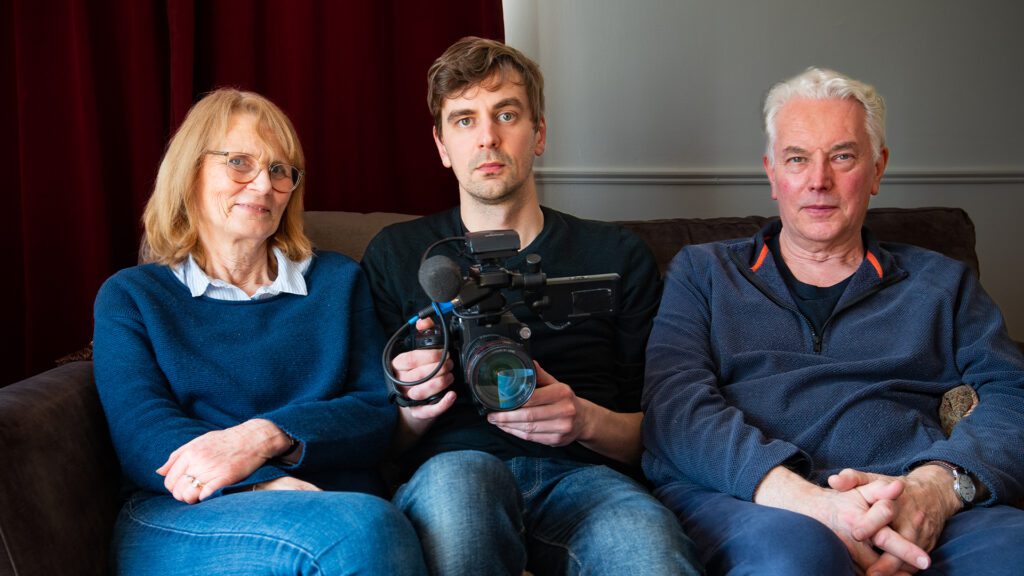Strength in Vulnerability
Multi award-winning documentarian Duncan Cowles will premiere his first feature-length project at Sheffield DocFest this summer. The film is called Silent Men and it explores the stigma and taboo surrounding male mental health in the UK. It’s a project that digs deep into our notions of masculinity and how such societal pressures hold men back from opening up about their emotions. What are the consequences of keeping them bottled up? And how does it feel to express these long-suppressed feelings and receive support? Today, Duncan explores how these questions – paired with his own desire to get better at being vulnerable – served as the starting point for this documentary. Read on to learn more about his experience doing group therapy at a men’s retreat; what he wants to achieve with Silent Men as well as the personal significance of making his short Outlets (2023), which won the prize for Best Editing at ASFF 2023.
ASFF: It’s exciting to hear that Silent Men, your first feature-length film, is set to premier at DocFest this summer! Could you give us an introduction to the film?
DC: Silent Men is a (hopefully moving and entertaining) journey through male mental health. It’s part road trip, part therapy as I travel across primarily Northern parts of the UK and ask men how they deal with their emotions. I think it explores aspects of masculinity that are often little discussed in an open and honest way. The film is underpinned by my deep personal motivation to get better at opening up to my family and loved ones since it’s something I’ve always struggled with and could feel myself getting worse at as I aged. So, we also see my own personal journey as the narrative of making the film itself plays out on screen.
ASFF: What sparked the idea for this project?
DC: I think a deep frustration and worry about my own uselessness at being able to open up and show my feelings to loved ones. Around the time that the idea came about (2016-ish), there was a bit of a surge of male mental health stuff in the UK. Lots of statistics were being flagged about men and mental health. For example, research shows that avoiding or hiding your emotions can be linked to dark outcomes, such as suicide, and that suicide was the biggest killer of men under the age of 50.
Around that time, I also became aware of how many people in my own life – or who I knew in some way – had battled with these things, and had also struggled with the same issues surrounding opening up. It frightened me just how bad the statistics with men were in the UK – and so I decided to do a film about it.
ASFF: Male mental health is at the heart of this documentary. How do you approach this topic?
DC: I think the stats and themes around male mental health are very uncomfortable for people to talk about. With that in mind, I was keen to make a film that felt accessible. I wanted it to contain a lot of humour in addition to the more serious moments. So, from the get-go I wanted this film to feel fun and like something you’d actually want to watch, rather than some doom-and-gloom documentary about mental health. That way, hopefully more people will see it and it will potentially make more of an impact.

ASFF: Could you share with us some of the themes that came up after interviewing men on this road trip? What are your reflections on the experience?
DC: As part of the film, I went on a men’s retreat where I took part in male group therapy for a whole weekend in a lodge with 16 blokes… that was eye opening and unlike anything I’d ever experienced. I also filmed with a lot of men who did express their emotions but just very privately or in quite controlled settings. This seemed to be easier to cope with than opening up in front of all their loved ones. For example, one man in Silent Men has a ritual where he films himself crying whilst listening to a specific Martha Wainwright song as a way to “purge” and keep on top of his emotions. As I filmed more and more people for Silent Men, I became aware I was only going to scratch the surface of this gigantic topic…
However, from what I’ve seen and heard, and from the conversations and experiences I’ve had around the film, it’s clear to me that there is a huge issue with men and how they express themselves. It feels like a cop-out to say “it’s super complicated”… but of course it is. Everyone is different and so I can’t speak for all, but in general, it feels to me like many men feel unable to express themselves due to societal pressures, or some inexplicable feeling that’s programmed into them from an early age. Some men seem to feel that if they open up and be vulnerable, it will lead to “bad” things or they will be judged and embarrassed in some way. However, for the most part, what I’ve seen is the opposite. Opening up leads to stronger connections with loved ones and those around you, and feeling happier and more at peace with yourself and in life. I don’t think opening up and talking solves all of your problems, but it certainly does seem a productive step towards a more healthy way of being.

ASFF: Your ASFF Award-Winning short Outlets explores grief, as we follow your attempts to process the loss of your grandma through film. What has it felt like making this film and then sharing it with the world?
DC: I think making Outlets was probably the most therapeutic experience I’ve ever had creating something. I really was quite lost, and felt so stuck that I needed to put the feelings of sadness and pain that were inside me out and into something. Losing a loved one is usually sad, regardless of the context, even if it was time. There’s a longing for something and someone that’s gone, and until I put that into the film, I felt like it was going to hold me back in different ways in my life. So, sharing the film is as much a part of that cathartic journey of expression as the creating of the film. I felt really humbled by the success of Outlets with audiences, and it really helped me move past some of the pain I had inside.
ASFF: We’ve had the pleasure of screening a number of your projects, such as Taking Stock, Isabella and Alexithymia. What impact has being part of the Aesthetica Short Film Festival had on you?
DC: I think when an organisation such as Aesthetica continually supports you and your work, it’s really important because it feels like someone believes in you and has your back. I think if it wasn’t for Aesthetica and other festivals who’ve supported my work over the years I might have lost faith in my own ability a long time ago and perhaps stopped making things, who knows… so thank you Aesthetica Short Film Festival.

ASFF: What’s next? Could you share with us any short/feature projects you’re currently working on?
DC: To be honest, there’s still a lot of work to do getting Silent Men out into the world and screening it at other festivals, having it distributed etc… So that will probably dominate my schedule for another few months at least. After that, I’m not sure. I have a little playful short film I’m hoping to finish early next year that I started at the beginning of 2023, and a couple of other ideas that have been sitting with me for a while now. I’m not sure what form they’ll take yet, maybe feature length again, or maybe they’re more series based…There will be more work from me in some form, that’s all I can promise. If you’re reading this and you are a funder, please get in touch.
Sheffield DocFest | Screening + Q&A | 13 June at The Light (Screen 6) & 14 June at Showroom (Screen 1)
Book Your Tickets
Stills:
- Silent Men (2024), dir. Duncan Cowles
- Outlets (2023), dir. Duncan Cowles
- Silent Men (2024), dir. Duncan Cowles
The post Strength in Vulnerability first appeared on Aesthetica Short Film Festival.
231